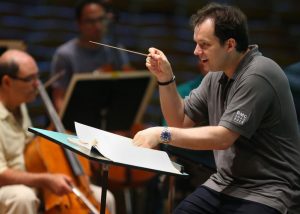Andris Nelsons in the News
This past Sunday, the Boston Globe ran a front-page article about their new Music Director, Lativian conductor Andris Nelsons, whose contract has recently been extended through 2022. Globe critic Jeremy Eichler is obviously entranced by Nelsons’ body language; the online article includes a gallery of photographs of “Nelsons in Motion.” Watching him at an afternoon rehearsal, Eichler writes,
he could be seen plucking individual eighth notes out of the air with two fingers and flicking them over his shoulder like errant fireflies.
Eichler writes about the “symbolism of the conductor’s power” and the cult of the maestro, “which can be catnip for skeptics.” He goes on to assess Nelsons’ approach to conducting.
But after observing Nelsons on the podium, and hearing him speak about the peculiar task of limning the sublime with a slender piece of wood and cork, one begins to grasp three elements that distinguish his approach.
It is a sui generis, full-body language of gesture through which he conveys his own insights into, and identification with, the music’s character; a striving for performances that may not be the final word on a score, but which nonetheless pulse with life; and a sense of unguarded exuberance and sincerity that, when trying to win the engagement of jaded professionals, may be his secret weapon.
Eichler claims that Nelsons use of body motions is proportionately much more significant than most conductors, which can create a tension for those desiring a mostly-audio experience.
Nelsons seems aware of the tension. In conversation he cited Herbert von Karajan’s famous injunction not to “disturb” the music. And in certain recent podium outings, he seemed to be attempting to use his physicality more judiciously.
“It’s something I’m trying to analyze,” said Nelsons, “because you want to help [with big gestures] but firstly it doesn’t always help, and secondly it’s not always necessary. But in certain moments, [small gestures] would not sufficiently inspire.”
He ends the article with a discussion of the perception of the members of the Boston Symphony – a discussion I found quite interesting and somewhat amusing.
Conducting any score can require countless hours of private study. Then comes the day of the first rehearsal, and the age-old question of how one draws out the best from an ensemble. According to orchestral lore, the players can size up a new conductor in less than five minutes of watching him work…
He is younger than many players in the BSO, and he is not infrequently in the position of having to lead a work that he has performed fewer times than a good portion of the musicians in front of him.
Nelsons seems to sidestep this potential dilemma by declining to play the role of the omniscient grand maestro, choosing instead to present himself as a decisive yet fallible co-creator, conducting not from on high but from deep within the music’s flow…
Investment by the players is requested but not assumed, leaving a space for active choice. From an audience’s perspective, this can make the difference between a night in which expert professionals solemnly illustrate a distant masterwork, and an evening in which the music smolders with the heat of a genuine event.
All-in-all, a very interesting insight into one of the rising superstars on the podium today.


Leave a Comment: